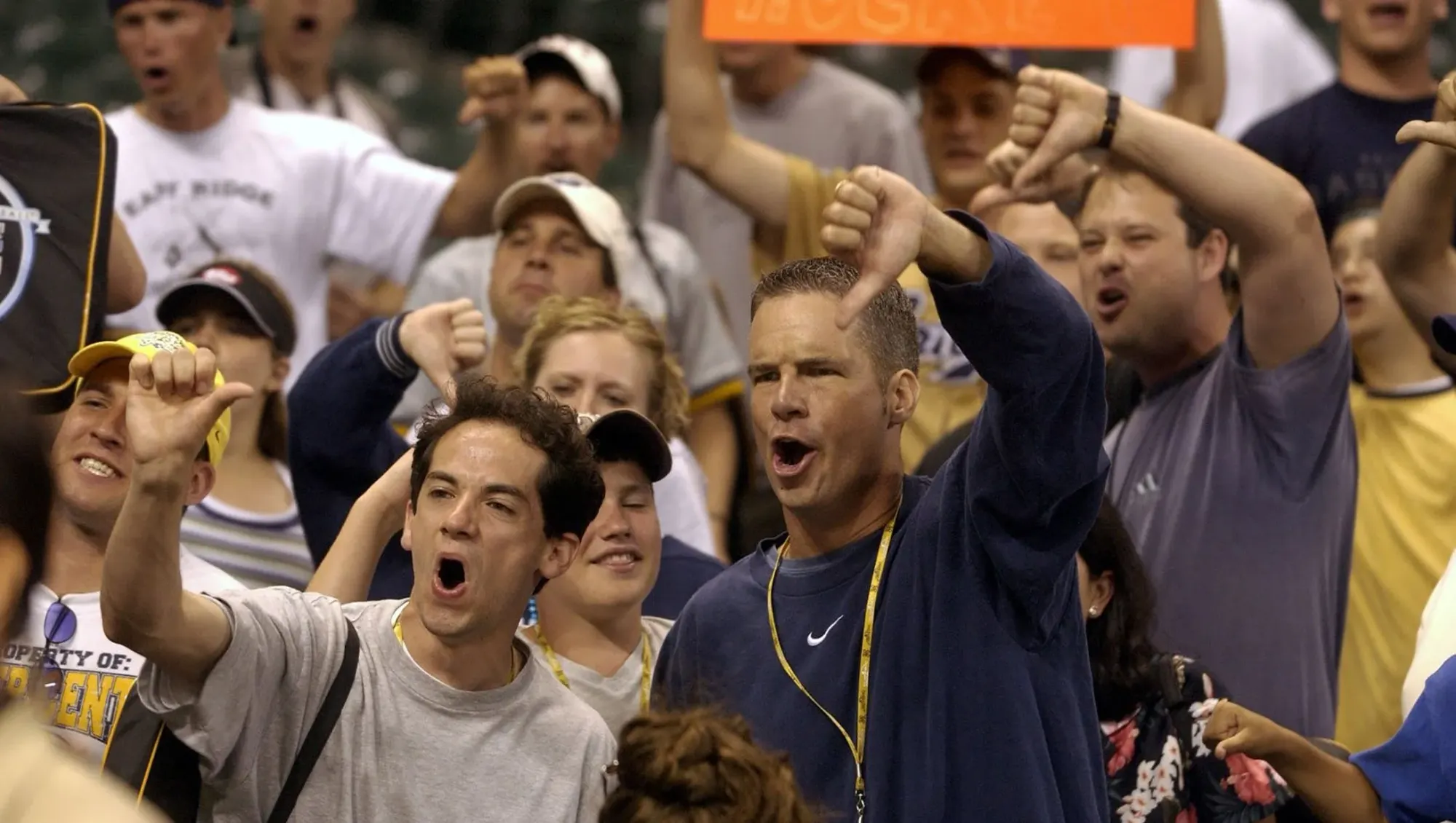Effectively Diffusing Inappropriate Fan Behavior
If there’s poor fan behavior at your events you, whether it directly involves you or not, you may feel like you’ve lost control. Utilize these strategies to promote the true values of education based athletics to define the expectation of your loyal fans.

By Scott Garvis, CMAA
Bound AD in Residence
As an athletic leader dealing with inappropriate behavior can make your stomach tighten into knots and make you question why am I doing this? If there’s poor fan behavior at your events you, whether it directly involves you or not, you may feel like you’ve lost control. Utilize these strategies to promote the true values of education based athletics to define the expectation of your loyal fans.
Effective conflict resolution is a skill that athletic administrator can benefit from learning.
Most conflict occurs because fans do not respond to our officials judgment in the heat of an athletic competition. As you are aware there may be differences of opinion on officials calls, or a misconception that the officials are showing favoritism to the opposing team. Despite constant education to curtail inappropriate fan behavior, it may not always be possible to avoid a confrontation with a fan displaying poor sportsmanship.
When conflict occurs at your sporting events, here are some proven techniques you can use to help you diffuse the conflict and find a resolution:
Diffusing the Conflict
- Break the Tension. Consider discussing the issue with humor. Humor can go a long way toward diffusing conflict. Humor can help you diffuse tense situation when handled properly: Consider using these tips in address your unruly fans.
- First & Foremost developing positive relations with your fans prior to having issues is essential in addressing fan behavior.
- Using humor can gently pull your inappropriate fan out of the Mob Mentality
- A well timed joke can ease the tensions after a questionable call
- Humor can help your fans bounce back & overcome adversity during the event
- Humor can add some perspective to the situation
- Humor can loosen the tension in a heated game
Don’t expect this strategy to always solve the issue. However, it will give you a chance to distract the situation or redirect the anger so you can gather your thoughts, cool down, and begin to work toward a solution.
Athletic Administration Strategy
"I had a fellow AD who used to have a pocket full of suckers and would go up, sit down and say, 'Why don’t you put this in your mouth and enjoy the game'?"
-Bill Fitzgerald Nebraska Interscholastic Athletic Administrator Association Executive Director
- Communicate & adhere to school district & state association sportsmanship policies. If the problem is at your event, refer to your school district & state association sportsmanship policy. While your policies may not consider every possible issue in your handbook, it should address many common problems. Using these policies as a guideline prevents miscommunication in what you allow or do not allow from your fans. Consider the following strategies to promote your school district & state association sportsmanship policies.
- Discuss fan expectations at your sports parent meetings
- Work with your Booster organizations to communicate appropriate fan guidelines
- Display Signage with Fan Expectations
- Have your Announcer Read Sportsmanship Communication throughout the event
- Compliments of Dr. Jake Von Scherrer Sample Pre-Game Sportsmanship Announcement
- Utilize Social media to promote Sportsmanship
- Consider having a student-athlete from each team read a sportsmanship PSA prior to your event
- Reach out to your Local Radio & Media outlets to encourage them to play the NIAAA Sportsmanship PSA’s
"Try to visit with fans as they walk in the facility. Identify issues early in the stands. Go up and sit next to the offender, introduce yourself, and remind them they are at a HS event, where we encourage Sportsmanship. Give them.the warning that next time likely will mean removal from the event. Always have other administrative help as well as law enforcement present. Be calm and polite but firm, and always refund the ticket if you have to remove them from the contest."
-Bill Fitzgerald Nebraska Interscholastic Athletic Administrator Association Executive Director
- Be Proactive & Act quickly. If at all possible, avoid putting off the conflict for a more convenient time. Allowing poor fan conduct to continue will only serve to make your position as an athletic director more stressful. “Swallow the Frog” as Brent Buttjer from Dallas Center Grimes puts it… It’s best to deal with it issues immediately.
- Work with your Student Leadership to set clear expectations | Provide them the opportunity to lead!
- Create a Super Fan Council
- Consider having a student sportsmanship summit
- Here is a sample ACSD Sportsmanship Summit
- Discuss fan expectations at your sports parent meetings
- Work with your Booster organizations to communicate appropriate fan guidelines
- Address fan behavior immediately (Work the Event | Not Watch the Event) Jay Hammes
"I don’t have to tell you that Preventing Poor Behavior is better than having to deal with it! This is something we created – with some students – at my last school and our PA Announcer would read it before every home game (Our PA Announcers were also usually students!) It always got some chuckles but it really did help. Did we still have the occasional knucklehead, yes – and sometimes it was our own students – but for the most part it helped announce the tone of what we expected."
-Dr. Jake Von Scherrer Educational AD Podcast Host
Finding a Resolution
- Identify the problem. This is the first step to resolving a conflict effectively. You’re not likely to solve a problem if you have no idea what it is. To determine what the problem is, talk calmly and listen .
- State your needs. It’s quite possible the person who’s angry doesn’t really know what the problem is. Simply state your expectations calmly. Voicing their frustration may reduce some of their anger. Take some time to listen, sometimes people just need the opportunity to vent their frustrations.
- Clarify your understanding. Once the problem is identified, it’s time to start communicating with the “drive through” method:
- Allow the fan to describe their side of the issue & expresses their feelings.
- Then as the Athletic Director repeat back to them that understand their frustration.
- Then allow the fan to add more information, explanation, or clarification.
- When the fan has said everything they need to say, it’s your responsibility to share your fan expectations.
- As you explain the expectations check for verbal & non-verbal cues to check for understanding.
- If the fan unruly behavior persists you may have to remove the fan from the event.
- Find a solution. Now that you know the issue, you can work on resolving the conflict. It’s planning time. Ask the following questions:
- What can we do so we on the same page?
- How can we work together to improve fan behavior?
- If we cannot resolve the issue right away, what can we do to work toward a resolution? When we are more intent on finding a solution rather than arguing or fighting, we’re more likely to find a solution, then you and the fans can enjoy watching your teams compete.
- Follow through. Be sure to follow through with the steps necessary to solve the initial problem. If the policies, processes, & procedures are not adhered to, you risk the chance of the same fan behavior reappearing. Conflict resolution is tricky business. The key is in diffusing conflict effectively and quickly.The sooner the conflict is diffused, the sooner you can work on a resolution that is a win-win proposition for all fans involved.
About Scott Garvis
Scott Garvis has been a leader and innovator in intercollegiate and interscholastic athletics development and fundraising for more than 25 years – as an athletics director, coach, association board member, adviser and editorial contributor.
Scott has a record of excellence as Athletics Director, Director of Activities and Assistant Principal, having led the athletics departments at six high schools or school districts in three states. He has achieved unparalleled success at all levels of high school athletics: large public school districts, a small public high school, a private school, and with state and national athletics administrator associations.
